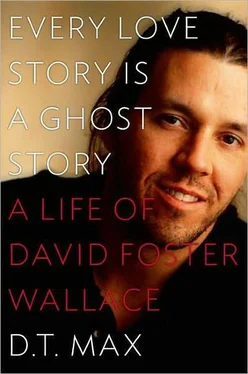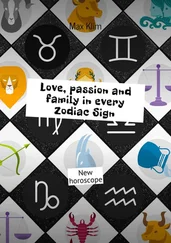But he turned out not only to come from a different world but also to be quite sensitive. And it did not take Wallace long to see the possibilities in a lug with an interior life. There was a sort of Dostoevskian gloss to him, the redeemed criminal, and Dostoevsky was on Wallace’s mind. He wrote to Dale Peterson shortly after arriving that “going from Harvard to here” was like “House of the Dead…with my weeks in drug treatment composing the staged execution and last minute reprieve from same.” The reprieve, he hoped, would spur the same creative surge it did in the Russian. 6But his sense that he could write fiction came and went. Fortunately, Wallace had nonfiction left over from before his intake. He had given up on the pornography essay, but he still owed his piece on Wittgenstein’s Mistress to the Review of Contemporary Fiction . “I think part of why WM is so hard for me right now is that I’m feeling very Kate-ish,” Wallace wrote Steve Moore a month after arriving at Granada House, meaning he was still battling to make a movie when snapshots were all his newly-sobered mind was offering. At Yaddo and in Somerville, he explained, he had also had a great deal of trouble with the project, giving it two tries, “one a vapid gushy book-review thing and the other — not yet typed — a 70-page screed that’s like Harold Bloom on acid.” All the same, he trundled his Tractatus and David Markson’s novel now to the nearby library and in a matter of a month produced a work several times the length of a typical essay.
A new clarity was beginning to emerge in his attempt to wrest such central concerns as self-consciousness and loneliness into controllable form. The prose style that would later separate Wallace’s nonfiction writing from that of his peers was taking form. The approach owed something to Cavell’s plainspokenness and to Bangs’s hipster idiom and yet it was distinctive. It combined informal diction—“way” as an adjective, “weird” and “sort of” where most would write “strange” and “to some extent”—with recondite polysyllabic nouns, a mixture that hinted at the way high and low culture were jumbled in his mind. “And but so” became a way to begin his sentences, an apt phrase to kick off his hurrying, zigzagging thoughts. Wallace was beginning to find the meeting place between a brain in overdrive and a language that had been invented for more leisurely use. It helped that the issues Wittgenstein’s Mistress raised were slightly behind him now. He could look back from his new position of sobriety when he wrote of Kate’s “continual struggle against the slipping sand of English & the drowning-pool of self-consciousness” or asserted that “the empty diffraction of Kate’s world can map or picture the desacralized & paradoxical solipsism of U.S. persons in a cattle-herd culture.” When Moore had editorial questions, he’d call the halfway house, and Wallace, at the front desk, would pick up.
Wallace also began to write book reviews for newspapers and magazines. Though he took them for money, these too helped him organize his thinking. Since his teenage years he’d had a taste for thrillers — they answered the need in his brain for instantly recognizable structures and cartoonish characters — so he was well suited to review Clive Barker’s The Great and Secret Show for the Washington Post , criticizing the writer as “one of those dreaded commercial successes who’ve become so impressed with themselves they no longer think they have to work at being interesting.”
Fiction was, of course, what Wallace really wanted to write, but here he was having less luck. Some piece of him still felt too fragile to attempt an effort so key to his well-being. The problem, he felt, was not really the words on the page; he had lost confidence not in his ability to write so much as the need to have written. Franzen offered to get together that April when he was in Boston, despite Wallace’s changed circumstances. Wallace said fine but stood him up after they made plans. But because one tenet of recovery is to make amends to those you have wronged, he sent a quick note to his friend explaining his behavior. “The bald fact is that I’m a little afraid of you right now,” he wrote. He begged to be allowed to bow out of their embryonic competition, to declare a truce against this writer who was so “irked by my stuff,” because Wallace was no longer “a worthy opponent in some kind of theoretical chess-by-mail game from which we can both profit by combat.”
He went on:
All I can tell you is that I may have been that for you a couple/three years ago, and maybe 16 months or two or 5 or 10 years hence, but right now I am a pathetic and very confused young man, a failed writer at 28, who is so jealous, so sickly searingly envious of you and Vollmann and Mark Leyner and even David Fuckwad Leavitt and any young man who is right now producing pages with which he can live and even approving them off some base-clause of conviction about the enterprise’s meaning and end that I consider suicide a reasonable — if not at this point a desirable — option with respect to the whole wretched problem.
His avoidance of his only literary friend made him mad at himself, as his anger looped, but to be sitting at a table discussing how to create art would be an inherently false gesture, he felt, because, as he explained to Franzen, he was no longer really an artist:
The problem’s details are at once shameful to me and boring to anyone else. I always had great contempt for people who bitched and moaned about how “hard” writing was, and how “blockage” was a constant and looming threat. When I discovered writing in 1983 I discovered a thing that gave me a combination of fulfillment (moral/aesthetic/existential/etc.) and near-genital pleasure I’d not dared hope for from anything.
He added, “I have in the last two years been struck dumb…. Not dumb, actually, or even aphasic. It’s more like, w/r/t things I used to believe and let inform me, my thoughts now have the urgent but impeded quality of speechlessness in dreams.”
Franzen quickly wrote to reassure him there were no hard feelings. He had only been hoping for “some laffs and companionship from a late afternoon with you in Cambridge.” He too had felt “joyless” in his writing lately. Wallace, though, like a cancer patient having to explain himself to a headache sufferer, did not think their discomfort was equivalent. Two weeks later, hiding out in the Brighton library instead of working on a rulebook for Granada House, he read a popular adventure novel—“a kind of a ripping good read”—and wrote his friend again to try to explain his problem: “I think back with much saliva to times in 1984, 5, 6, 7 when I’d sit down and look up and it would be hours later and there’d be this mess of filled-up notebook paper and I just felt wrung out and well-fucked and, well, blessed.” His anguish, he wrote, had multiple sources, from a fear of fame to a fear of failure. Behind the ordinary fears lurked the fear of being ordinary.
Even as Wallace was complaining that he had lost his old reason for writing, Franzen in his letters was quietly suggesting a replacement. He would remind Wallace of the pleasure Franzen took in creating characters he loved and how the stories he had liked in Girl with Curious Hair had given him the same satisfaction; both were part of “the humble, unpaid work an author does in the service of emotion and the human image.” A year before when Franzen had suggested something similar, Wallace had dismissed it as twaddle. Back then, in the same letter in which he said readers were welcome to think he was an asshole, he had made clear that
[f]iction for me is a conversation for me between me and something that May Not Be Named — God, the Cosmos, the Unified Field, my own psychoanalitic cathexes, Roqoq’oqu, whomever. I do not feel even the hint of an obligation to an entity called READER — do not regard it as his favor, rather as his choice, that, duly warned, he is expended capital/time/retinal energy on what I’ve done.
Читать дальше












